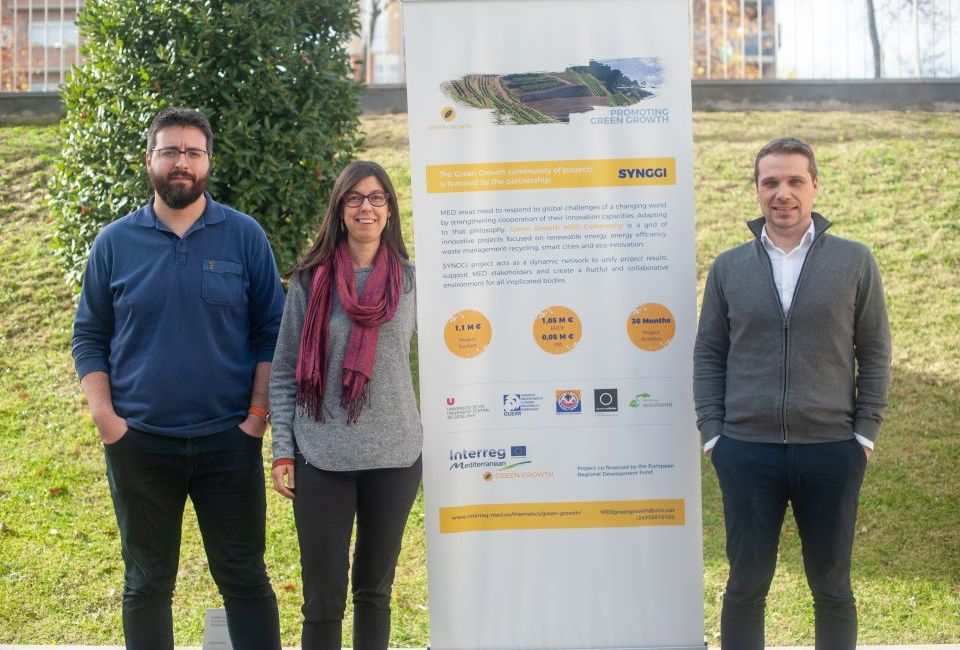
The BETA Technology Centre is leading a community of 14 European projects to extend the green economy to the entire Mediterranean region
The countries of the Mediterranean region are facing challenges as a result of unsustainable human activity, including the decline of natural resources, climate change, water scarcity, the growth of urban environments and rising pollution levels. At the same time, positions with a Mediterranean perspective are not always adopted when European environmental policies are defined. In this context, the European Green Growth community was established three years ago. It is coordinated by the BETA Technology Centre (Biodiversity, Ecology and Technology and Environmental and Food Management) at the University of Vic - Central University of Catalonia (UVic-UCC) and operates under the auspices of the Interreg MED programme.
This community shares and creates synergies from among 14 European projects which have so far brought together 165 institutions, entities and companies in the Mediterranean region, which work towards sustainable development in the region, in fields as varied as the food industry, smart cities, waste management and obtaining funding.
A community of green economy projects
According to its coordinator, the BETA Technology Centre researcher Mercè Boy-Roura, the ultimate goal behind the creation of this community has been "to establish an umbrella project that enables other more specific projects to have a real and relevant impact on the territory, either by transferring innovative business models to companies or by influencing policymaking." Boy-Roura believes that "these are things that would be difficult for each project to achieve individually and in isolation."
During its first three years, from November 2016 until last October, the project was called Synggi (Synergies for Green Growth Initiatives). During this period, it worked to establish and launch the community, bringing together projects and actors that innovate in the field of the green economy, or in other words, "the economy that improves human well-being and social fairness, reduces environmental risks, is efficient in the use of resources and follows a model that takes into account the social dimension and the conservation of ecosystems," according to Boy-Roura's definition. She says that "having created a sense of belonging to the group among very diverse projects, and a working dynamic based on cooperation that has established dynamics that are very rare in this field" while completing the first phase of the project has been very important.
With UVic-UCC as its main partner, the community has six other members: an Italian consortium that includes most Italian universities working on industrial and managerial economic issues (CUEIM), the Centre for Energy, Environment and Resources (CENER21) in Bosnia and Herzegovina, the companies Dynamic Vision from Greece and REVOLVE Mediterráneo from Barcelona, the French network ANIMA Investment, and the European Regions Research and Innovation Network (ERRIN) in Belgium. The 14 projects that make up the community are in practice a network consisting of up to 165 of all kinds of institutions, including the public administration, the private sector, academia and civil society, on both the north and south coasts of the Mediterranean. In total, the community involves 13 countries and has a budget of around 30 million euros. The participants on behalf of the BETA Technology Centre also include its director, Sergio Ponsá, and the centre's manager and promoter Albert Palou.
Three more years to influence political decision-making
The second phase of the Green Growth community began this November, and will continue until June 2022. Over these three years, the members coordinated by the BETA Technology Centre will continue to work in four major working groups, covering four major subject areas aligned with European environmental policies: efficiency in the use of natural resources; green and intelligent management of public services; waste management and reduction, and competitiveness and innovation.
Mercè Boy-Roura believes that its next objectives are clear. First, "to work together so that the Mediterranean region makes the transition to a new sustainable economic model, in other words, to a working model that prioritises the reuse, repair, remanufacturing and recycling of materials and products as opposed to the consumption of raw materials." This means "making different proposals in many different fields and in many different ways, but always on a coordinated basis that meets the region's needs."
Meanwhile, the success of the Green Growth community will also involve "being able to transfer our results to the regional and national government bodies and to the economic and industrial sector," so that they all "take them into account and include them when legislating and making decisions."
Inclusion in the agenda of the Union for the Mediterranean
At the end of the first phase and the beginning of the second, the Union for the Mediterranean (UfM) endorsed the Green Growth community, giving it recognition that is awarded to projects that the 43 countries in this intergovernmental organisation unanimously believe are important for the future of the territory. In the case of Green Growth, the endorsement is an acknowledgement of the results obtained by the community, and it is including them as a benchmark in its own strategic agenda. At the same time, it believes that the initiative brings specific benefits to the citizens in the Mediterranean arch, and contributes to the integration of the various regions that are a part of it.
According to Mercè Boy-Roura, "being part of the strategic agenda of the Union for the Mediterranean is very important for the community, because it means that the 43 member countries consider the green economy as a priority in the Mediterranean and they also use our results as a benchmark." According to the researcher, "taking this step has taken us to a level of influence that we would not have thought possible at the beginning of the project."